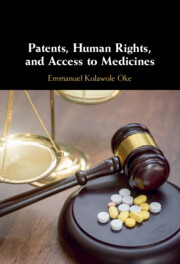Book contents
- Patents, Human Rights, and Access to Medicines
- Patents, Human Rights, and Access to Medicines
- Copyright page
- Contents
- Acknowledgements
- 1 Introduction
- 2 Patent Policy, Access to Medicines, and the Regulatory Theory of Patent Rights
- 3 The Interface between Patent Rights and the Right to Health under International Human Rights Law
- 4 Incorporating a Model of Human Rights into the Adjudication of Pharmaceutical Patent Cases (Part One)
- 5 Incorporating a Model of Human Rights into the Adjudication of Pharmaceutical Patent Cases (Part Two)
- 6 Incorporating a Model of Human Rights into the Adjudication of Pharmaceutical Patent Cases (Part Three)
- 7 Conclusion
- Index
2 - Patent Policy, Access to Medicines, and the Regulatory Theory of Patent Rights
Published online by Cambridge University Press: 24 February 2022
- Patents, Human Rights, and Access to Medicines
- Patents, Human Rights, and Access to Medicines
- Copyright page
- Contents
- Acknowledgements
- 1 Introduction
- 2 Patent Policy, Access to Medicines, and the Regulatory Theory of Patent Rights
- 3 The Interface between Patent Rights and the Right to Health under International Human Rights Law
- 4 Incorporating a Model of Human Rights into the Adjudication of Pharmaceutical Patent Cases (Part One)
- 5 Incorporating a Model of Human Rights into the Adjudication of Pharmaceutical Patent Cases (Part Two)
- 6 Incorporating a Model of Human Rights into the Adjudication of Pharmaceutical Patent Cases (Part Three)
- 7 Conclusion
- Index
Summary
This chapter critically examines some of the popular theoretical justifications that have hitherto been postulated as explanations for the existence of intellectual property rights in general and patent rights in particular. The focus here is limited to the Lockean theory, the Hegelian theory, the utilitarian theory, and the regulatory theory. The chapter is structured into four sections. Sections 2.2 and 2.3 examine the Lockean and Hegelian theories, respectively, while Sections 2.4 and 2.5 focus on the utilitarian and regulatory theories, respectively. The chapter concludes with the view that the regulatory theory of intellectual property is the only theory that adopts a broad socio-centric approach. Thus, any developing country that seeks to preserve its patent policy space and secure access to medicines for its citizens should treat intellectual property law (including patent law) as an instrument that regulates the grant of exclusive rights to creators.
Keywords
- Type
- Chapter
- Information
- Patents, Human Rights, and Access to Medicines , pp. 32 - 68Publisher: Cambridge University PressPrint publication year: 2022



